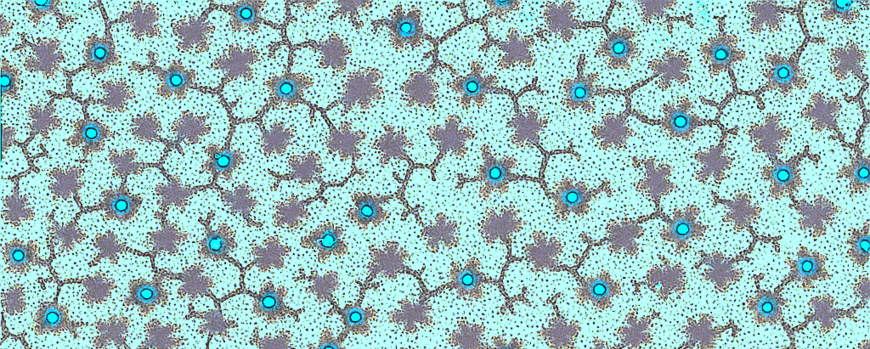
Environments in and as Networks: A Digital Humanities Hackathon
Potsdam, 15-17 April 2026
What? A collaborative event on challenges and research perspectives in Digital Environmental Humanities, focusing on the methodology of network analysis, on the idea of environments as networks, and on the representation of environments in neural networks
Where? Potsdam
When? Registration starts on October 06, 2025 ("first come, first serve") | event: April 15, 2026 to April 17, 2026 | see timeline for the pre-hackathon programme
What is this all about?
Ecology is about relations: “Nothing is connected to everything; Everything is related to something” (Donna Haraway). In this sense, human-environment-relations and more-than-human-relations are important notions in the Environmental Humanities. The network’s relational model – as a data structure, a method of visualisation, and an epistemic metaphor – in turn has become a central paradigm in Digital Humanities. Concepts such as embeddedness, the prevalence of interactions and connections over entities and actors, and the systemic openness and dynamism of network-like structures inform both formal and cultural network theory as well as Environmental Studies.
In our Digital Humanities Hackathon we will probe the ties between network thinking and environmental research through digital methods. On the one hand, we will examine how environments (captured in environmental data or media) can be modeled and analyzed as networks. On the other hand, we will explore how environments themselves are represented within the media networks of the past and present. And beyond all this, the question arises how environments are represented and processed in the new realities of the neural networks of current AI architectures.
Our hackathon welcomes researchers who would like to join us in our exploration on the interplay of networks and entangled environments from the perspective of Digital Humanities, Cultural History, and Media Studies.
Nice. But what is a hackathon?
The primary aim of a humanities hackathon, as we understand it, is to create a shared open space in which the participants take time to discuss and experimentally explore topics at the intersection of Digital Scholarship and Humanities. Therefore, a hackathon is not so much about producing finished results or presenting final products, but of jointly exploring possible paths, developing prototypes, discovering spaces of practice.
Challenges are at the heart of a hackathon. A challenge is a task to be approached in teams (but in particular cases also individually) during the entire hackathon. Challenges can be the development of software or website prototypes, the execution of digital analyses on databases, archives, repositories, the building or processing (cleaning, enrichment, etc.) of data sets, the design of a data model, the creation of a new (maybe data driven) theory, and so much more. Participants faced with a challenge are usually asked to produce a specific outcome by the end of the hackathon (a poster, a website, a piece of software, a dataset, a concept paper, etc.). Challenges can be submitted to the organizers before the hackathon and will then be presented on this website. Together with spontaneous ideas, these challenges will be pitched at the beginning of the hackathon, after which teams will be formed to work on selected challenges during the hackathon. Everyone is welcome to propose challenges. You will find the respective form at the end of this website.
Okay. But what exactly will happen?
The hackathon itself is an on-site event with an estimated 40 to 50 friendly participants that will take place in Potsdam from 15 to 17 April. Additionally there will be a series of pre-hackathon events leading up to the hackathon, including a kick-off, lectures and workshops on methods. Please take a look at our timeline.
You've got me. What do I have to do?
Please fill out the following form …
- to register for the hackathon.
- You can also announce a challenge (but you don't have to do that to participate) and
- you can tell us if you have already committed to a particular team.
- Furthermore, you can provide us with information about research projects or data resources that could be relevant to our hackathon.
- And you can let us know if you need assistance with financing travel expenses (e.g. through a travel grant).
Environments in and as Networks: Registration form
Thank you!
We will keep you informed about further plans and upcoming events over the next few weeks.
Organisers
Potsdam Network for Digital Humanities
Sören Barkey, Luca Giovannini, Birgit Schneider, Peer Trilcke
Contact: digital-humanities@uni-potsdam.de
Bluesky: https://bsky.app/profile/dhpotsdam.bsky.social #EcoHack2026
